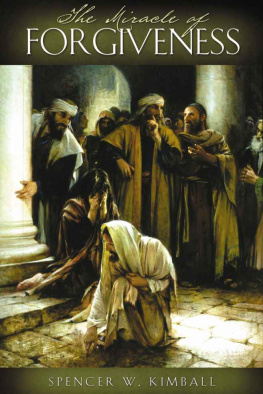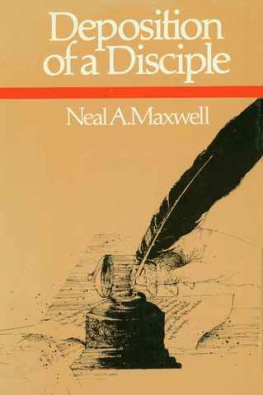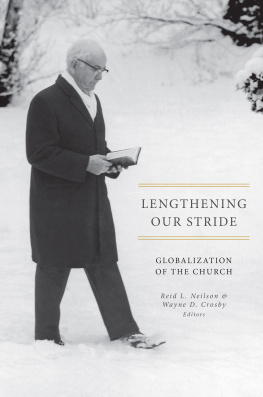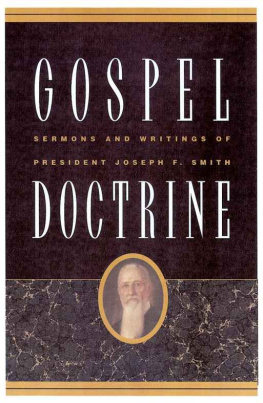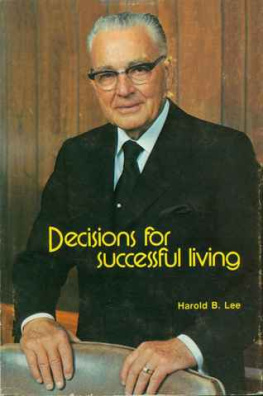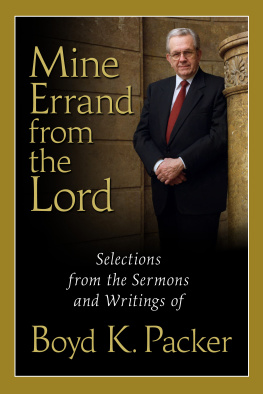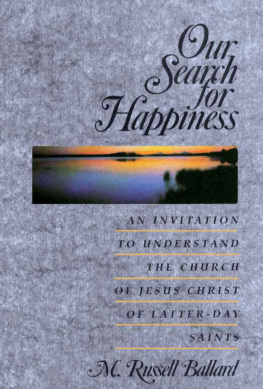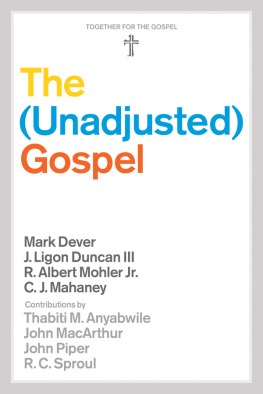Faith Precedes the Miracle
Spencer W. Kimball
1972 Deseret Book Company. All rights reserved. No part of this book may be reproduced in any form or by any means without permission in writing from the publisher, Deseret Book Company, P.O. Box 30178, Salt Lake City, Utah 84130. This work is not an official publication of The Church of Jesus Christ of Latter-day Saints. The views expressed herein are the responsibility of the author and do not necessarily represent the position of the Church or of Deseret Book Company. Deseret Book is a registered trademark of Deseret Book Company.
Preface
For as many years as I can remember the question has been, "How is your father?" My response to the question most often is to detail the latest news of his health and then add, "He still works harder than anyone I know." In this often-repeated exchange I am continually reminded of three major facts about him.
First, he is a widely known and loved man. Wherever I go people tell me about encounters with himhis remembering a name after years without contact, pulling on overalls to help his host milk the cows, writing individual letters to the parents of missionaries met during mission tours, giving his overcoat to someone who needed it more, and on and onand they sense about him a dedication to the work of the Lord and a concern about them personally, which warms their feelings toward him and their memories of him.
Second, though he is no hypochondriac and suffers stoically through it all, he has had during his amazingly active life enough illnesses to make one wince simply at the listingtyphoid fever, smallpox, Bell's palsy, years of boils and carbuncles, a major heart attack, cancer of the throat resulting in the removal of most of his vocal cords, recurrence of cancer requiring radiation treatment, heart disease requiring open-heart surgery to replace a valve and transplant an artery, and most recently Bell's palsy again. It is no wonder then that when someone asks about my father, it is typically to inquire about his health. However, considering his health history and his age77he is in amazingly good condition, having over a period of months since April, 1972, largely regained his strength after heart surgery so drastic as to have significant mortality rates in men his age.
Third, his capacity for work is phenomenal. He works hard and effectively and with rare dedication. Since his acceptance of the call as a General Authority, he has not stinted in his labors. He works to the point of exhaustion, yet recuperates remarkably quickly. It can be honestly said of him that he has hidden wells of strength upon which he calls so often and so substantially that one begins to think, erroneously, that they are inexhaustible.
For those who do not know them, some basic facts of his personal history may be of interest. Spencer W. Kimball was born in Salt Lake City, March 28, 1895, to Andrew and Olive Woolley Kimball. When he was a small child his father was called to move to Arizona to preside over a stake there. The family lived in Thatcher, Arizona. Father worked on the family farm, worked in a dairy in Globe, Arizona, in summers to earn his school money, and excelled academically and athletically in high school. He served a mission in the Central States. His university work was ended by a call to military service in World War I, but the war ended while he was still waiting for induction.
In 1918 he married Camilla Eyring, whose family had been driven from the Mormon colonies in Mexico during the Mexican Revolution in 1912; they lived in Pima, Arizona, a few miles from Thatcher. He was first employed in a bank and then helped develop an insurance and real estate partnership. He was called to serve as stake clerk under his father. Then, when his father died, he was called to serve as a counselor to the new stake president. In 1938 the stake was divided and he became the first stake president of the new Mount Graham Stake, with headquarters in Safford, Arizona, and a membership extending all the way to El Paso, Texas, 250 miles away.
During these years of laboriously building up a new business, attending to the leadership of a scattered stake, and running a small family acreage, he found time and energy for sports (especially handball) and community affairs. He contributed his efforts to the Boy Scout program, served on educational committees, worked in the Chamber of Commerce, and presided as a district governor of Rotary International. Though the family did not see him as much as other families might have seen their father, I felt no sense of abandonment; he was very much involved with us.
His call to the Council of the Twelve Apostles in 1943 was a soul-wrenching experience for him, as it must be for others called to that awesome responsibility. He described that climactic event in his life in his first conference address:
* * * * *
I feel extremely humble in this calling that has come to me. Many people have asked me if I was surprised when it came. That, of course, is a very weak word for this experience. I was completely bewildered and shocked. I did have a premonition that it was coming, but very brief, however. On the eighth of July, when President J. Reuben Clark called me, I was electrified with a strong presentiment that something of this kind was going to happen. As I came home at noon, my boy was answering the telephone and he said, "Daddy, Salt Lake is calling."
I had had many calls from Salt Lake City. They hadn't ever worried me like this one. I knew that I had no unfinished business in Salt Lake City, and the thought came over me quickly, "You're going to be called to an important position." Then I hurriedly swept it from my mind, because it seemed so unworthy and so presumptuous, and I had convinced myself that such a thing was impossible by the time that I heard President Clark's voice a thousand miles away, saying: "Spencer, this is Brother Clark speaking. The brethren have just called you to fill one of the vacancies in the Quorum of the Twelve Apostles."
Like a bolt of lightning it came. I did a great deal of thinking in the brief moments that I was on the wire. There were quite a number of things said about disposing of my business, moving to headquarters, and other things to be expected of me. I couldn't repeat them all; my mind seemed to be traveling many paths all at once. I was dazed, almost numb with the shock. A picture of my life spread out before me. It seemed that I could see all of the people before me whom I had injured, or who had fancied that I had injured them, or to whom I had given offense, and all the small petty things of my life. I sensed immediately my inability and limitations and I cried back, "Not me, Brother Clark! You can't mean that!" I was virtually speechless. My heart pounded fiercely.
I recall two or three years ago, when Brother Harold B. Lee was giving his maiden address as an apostle of the Lord Jesus Christ from this stand, he told us of his experience through the night after he had been notified of his call. I think I now know something about the experience he had. I have been going through it for twelve weeks. I believe the Brethren were very kind to me in announcing my appointment when they did so that I might make the necessary adjustments in my business affairs, but perhaps they were more inspired to give me the time that I needed for a long period of purification, for in those long days and weeks I did a great deal of thinking and praying, and fasting and praying. There were conflicting thoughts that surged through my mindseeming voices saying: "You can't do the work. You are not worthy. You have not the ability"and always finally came the triumphant thought: "You must do the work assignedyou must make yourself able, worthy and qualified." And the battle raged on.


